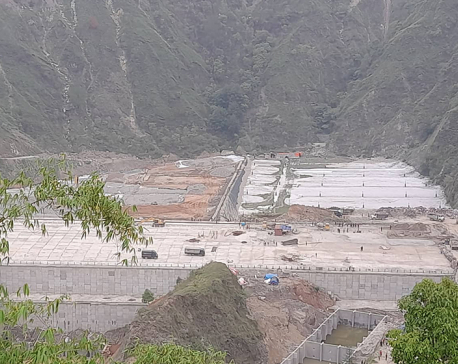
OR
KMC starts three-phase plan to address garbage crisis
Published On: August 5, 2018 04:25 AM NPT By: Biken K Dawadi
KATHMANDU, Aug 5: Kathmandu Metropolitan City (KMC) has come up with a three-phase plan for solid waste management in the Kathmandu Valley where garbage disposal has become a herculean task due to the unavailability of space at the Sisdol landfill site in Nuwakot.
The first stage of the plan, according to Chief Administrative Officer of KMC, Yadav Prasad Koirala, will be to manage some more space at the existing Sisdole landfill site in order to dispose more waste so as to buy some time to bring the second phase in place.
The second stage of the plan is to acquire about 35 ropani of land on lease near a land space of 65 ropani in the vicinity of Sisdole landfill site. The 100 ropani can accommodate the waste from the valley for three more years. Koirala said, “This is an important part of the plan because the third phase of the plan will have to be completed in those three years.”
As the third phase of the plan, KMC has planned to construct a long-term dumping site at Banchare dada, which is about two kilometers far from Sisdole. “In those three years, we will be able to construct a long-term dumping site at Banchare dada which will provide a permanent solution to the problem of solid waste management in the city,” Koirala added.
However, solid waste management experts have opposed the plan of KMC claiming that the metropolis is wasting time by trying to acquire land for a temporary dumping site.
“The government has already acquired more than 1600 ropani of land at Banchare dada, there is a gravel road connecting Sisdole to Banchare dada too. The metropolis should not be focusing on acquiring new land but making use of the land already acquired,” former Executive Director of Solid Waste Management Technical Support Center (SWMTSC), a governmental body under the Ministry of Federal Affairs and Local Development, Sumitra Amatya said, adding, “Spending time for acquiring new land will be like scoring a suicide goal.”
Amatya expressed her concern over the role of industries in the management of waste. She said, “The Solid Waste Management Act 2011 clearly states that the responsibility for the processing and management of waste shall be of the individual or body producing such solid waste. The industries should be taking the responsibility for their waste themselves. They should be focusing on the principle of 'Reduce, Reuse and Recycle' and manage their waste.” She also added that the metropolis should be emphasizing on making people aware of the segregation of waste in terms of biodegradable and non-bio degradable in order to help in the management of waste.
The government had acquired 15 hectares of land in Sisdole in 2005 to construct a short-term landfill site for the dumping of the waste for cities of six nearby districts including Nuwakot, Kathmandu, Bhaktapur, Lalitpur, and Ramechhap. A long-term waste dumping site was supposed to be constructed at Banchare dada by 2008, but the construction works there have been very slow with government officials claiming that not even 10 percent of the work has been completed.
Lack of technical expertise in waste management
Officials from SWMTSC have expressed their concerns about the shortage of bodies that can provide technical assistance for the management of waste.
Expressing his dismay over the existence of only one small-scaled government body for waste management, Executive Director of SWMTSC, Bishwa Mani Gyawali said, “Now that the local bodies have been given the responsibility of waste management and SWMTSC is limited to providing technical assistance to the local bodies, the question remains on how many local bodies can the center extend its technical assistance to.”
You May Like This

Locals threaten to obstruct dumping of garbage in Banchare Danda from August 17
KATHMANDU, July 28: The locals of Banchare Danda have announced that they will not allow the Kathmandu Valley’s waste to... Read More...

KMC starts seizing street vendor goods
KATHMANDU, July 6: Street vendors, hawkers and small-time traders have urged the government to designate them a place to carry on... Read More...





Just In
- NRB introduces cautiously flexible measures to address ongoing slowdown in various economic sectors
- Forced Covid-19 cremations: is it too late for redemption?
- NRB to provide collateral-free loans to foreign employment seekers
- NEB to publish Grade 12 results next week
- Body handover begins; Relatives remain dissatisfied with insurance, compensation amount
- NC defers its plan to join Koshi govt
- NRB to review microfinance loan interest rate
- 134 dead in floods and landslides since onset of monsoon this year












Leave A Comment